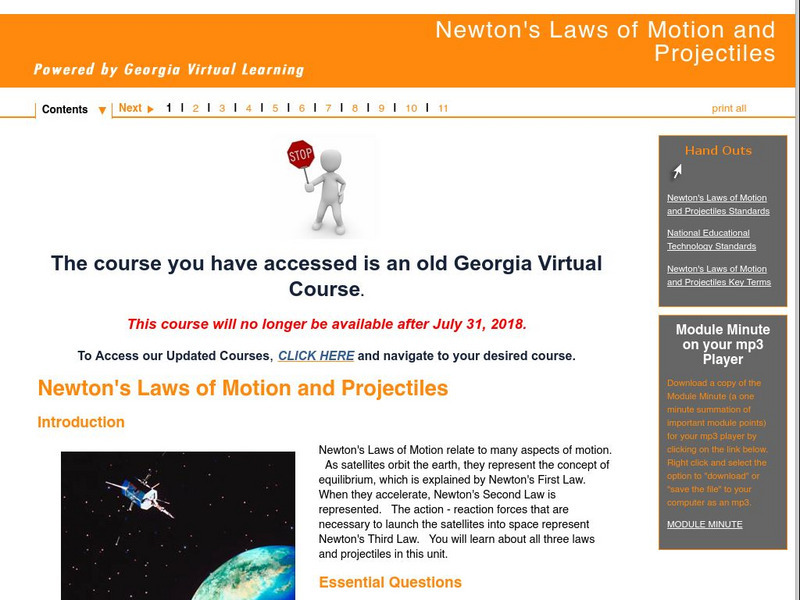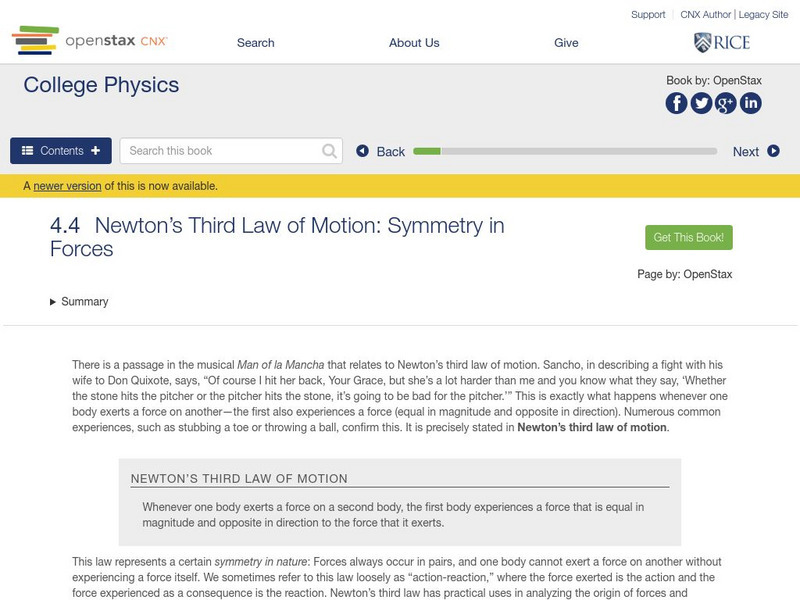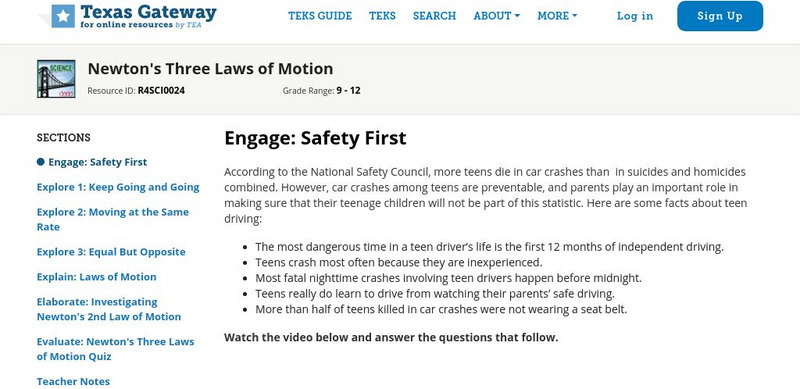Hi, what do you want to do?
CK-12 Foundation
Free Body Simulation
To show the magnitude and direction of all forces acting upon an object, scientists use a free body diagram. This simulation serves as an introduction to free body diagrams allowing scholars to build their own. Pupils select the proper...
Curated OER
Planet Paths: Studying Planetary Orbital Paths
Middle schoolers define and identify planetary orbit, ellipse, parabola, and hyperbola, and simulate Kepler's Second Law. They explore interactive websites demonstrating orbital motion and complete modeling activities.
CK-12 Foundation
Hot Air Balloon
How can people control a hot air balloon? The simple simulation allows scholars to adjust the payload mass, burner, and vent position on a hot air balloon and observe the changes in velocity and altitude over time. Challenge questions...
Urbana School District
Electrostatics
Why did lightning shock the man? Because it didn't know how to conduct itself. Presentation covers electric charges, insulators, conductors, electroscopes, lightning, generators, grounding, static electricity, and more. Presentation...
Curated OER
Cosmic Ray Momentum
Students describe how cosmic rays achieve high kinetic energy via conservation of momentum.
Curated OER
Modern Physics
In this physics worksheet, students tackle the hard questions about scientific theory and take a look at the First and Second Laws of Thermodynamics.
Curated OER
Newton's Third Law
Students describe an everyday situation which demonstrates Newton's Third Law. They state Newton's Third Law;"Every action has an equal and opposite re-action, or every force has an equal and opposite force" in their own words. ...
Curated OER
Galileo Galilei Questions for Study
In this online interactive philosophy worksheet, students respond to 10 short answer and essay questions about Galileo's contributions to science.
Curated OER
Intellectual History
In this online interactive world history worksheet, students answer 22 matching questions regarding the Enlightenment. Students may submit their answers to be scored.
Curated OER
Energy: Light -- Spinning Color Wheel
Second graders make spinning color wheels to determine how energy effects what colors look like. They paint or color a color wheel with the seven colors of the spectrum. Next, the spin the wheel to determine what happens. In order to...
Curated OER
Investigation 2 - Zoom Balls
Third graders create Zoom Balls to explain how sometimes both forces of push and pull need to be used at the same time.
Curated OER
Investigation 1 - Push and Pull
Third graders study the forces of push and pull on motion
Curated OER
Breathing Victory
Students discuss anaerobic respiration and how it relates to sprinting. After discussion of related processes, students create a brochure that explains the complex processes behind every muscular interaction.
Curated OER
In-Line Inertia
Pupils practice calculating the moment of inertia when discussing a skater and the position in which it is best to spin. After class discussion, students practice calculating inertia on their own.
Curated OER
Breathing Victory
Students know that participation in sports requires energy. They comprehend that we get energy form the foods that we eat and the air thta we breathe. Converting food and air into usable energy is defined as celluar respiration. Students...
Texas Education Agency
Texas Gateway: Newton's Law of Inertia
Review Newton's First Law of Motion in this interactive learning module.
OpenStax
Open Stax: Further Applications of Newton's Laws of Motion
In the following interactive students will begin to apply problem-solving techniques to solve for quantities in more complex systems of forces. They will also integrate concepts from kinematics to solve problems using Newton's laws of...
Georgia Department of Education
Ga Virtual Learning: Newton's Laws of Motion and Projectiles
Through informational text, interactive activities, practice problems, online labs, virtual simulations, and video clips, students learn about Newton's Laws of Motion.
Georgia Department of Education
Ga Virtual Learning: Ap Physics 1: Applications of Newton's Laws of Motion
Students apply Newton's laws to more diverse physical settings where multiple forces from varying origins interact. To aid in condensing the physical setting into mathematical expressions, the free body diagram is used in this module...
OpenStax
Open Stax: Newton's Second Law of Motion: Concept of a System
In the following interactive students will begin to define net force, external force, and system and understand Newton's second law of motion. They will also apply Newton's second law to determine the weight of an object.
OpenStax
Open Stax: Newton's Third Law of Motion: Symmetry in Forces
In the following interactive students will begin to understand Newton's third law of motion and also apply it to define systems and solve problems of motion.
Texas Education Agency
Texas Gateway: Newton's Three Laws of Motion
This resource provides alternate or additional learning opportunities for students learning the three Newton's Laws of Motion. It includes a collection of interactive materilas, videos, and other digital media.
Physics Classroom
The Physics Classroom: Momentum and Its Conservation: The Law of Action Reaction
Through examples and practice problems, this interactive tutorial helps students understand the Law of Action-Reaction as it has to do with Newton's Laws.
OpenStax
Open Stax: Normal, Tension, and Other Examples of Forces
In the following interactive students will begin to define normal and tension forces. They will apply Newton's laws of motion to solve problems involving a variety of forces and use trigonometric identities to resolve weight into...




























